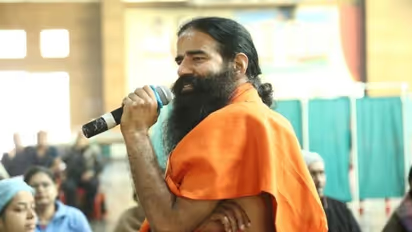'Do not stop Insulin...' doctors warn patients after Patanjali's advertisement claims Type-1 Diabetes cure

Synopsis
While a number of doctors have termed the advertisement as "propaganda and slander" that undermines the credibility of the doctors and erodes faith in modern science-based systems, others sought to explain the difference between a treatment and a cure.
Baba Ramdev has once again triggered a controversy after an advertisement carried by Patanjali Wellness in newspapers about 'Misconceptions spread by Allopathy' putting him in the medical fraternity's crosshairs.
The advertisement urged people to save themselves from the alleged misconceptions spread by the pharma and medical industry. It claimed that the lives of people taking medicines for years to control diseases like Blood Pressure, Diabetes, Thyroid, Asthma, Cholesterol, etc., had become hell due to the side effects of these medicines and prolonged diseases.
Patanjali further claimed that it had succeeded in rooting out diseases and making cores of people "free from all diseases" using scientific research on knowledge received from great sages like Charak, Sushrut, Dhanvantri and Patanjali.
Also Read: Singer Lucky Ali pens an open letter, alleges encroachment on his Bengaluru farm
The advertisement also claims that Patanjali had successfully cured Type-1 Diabetes, something that eminent doctors are now objecting to.
Taking to Twitter, Padma Shri Dr V Mohan, Chairman of Dr Mohan's Diabetes Specialities Centre, said: Those with Type-1 Diabetes, please do not be misled by such misleading advertisements. It is risky to your life if you stop Insulin. As of now, there is no cure for Type-1 Diabetes. Insulin is life-saving. Please continue it for Type-1 Diabetes."
While stating that he was not looking to pick up a fight with anyone, Dr Mohan said: "I am not fighting anyone. I am just worried that nothing should happen to children with Type-1 Diabetes. If anyone in India produces a cure for Type-1 Diabetes will be proudest Indian and am actually waiting for that day."
He further clarified: "I have the greatest respect for Ayurveda and other Indian systems of medicine and for Yoga. They work very well for many diseases. We need to do studies and generate more evidence. Today's world is science and evidence-based, which need not only be Allopathy."
Dr Ambrish Mithal, Chairman of Endocrinology and Diabetes at Max HealthCare, too, lashed out at Patanjali. He said, "Most statements in this ad are blatantly false. Misinformation. But some are downright dangerous. Curing Type-1 Diabetes? Leaving insulin? Request all Type-1 DM not to give up Insulin. It can be fatal."
CS Pramesh, Director of Tata Memorial Hospital, too voiced his concern over Patanjali's claim. While urging the Union Health Ministry and the Central Drugs Standard Control Organisation to take note of the claims made in the advertisement, he warned that "people could die if they follow this advice".
While a number of doctors have termed the advertisement as "propaganda and slander" that undermines the credibility of the doctors and erodes faith in modern science-based systems, others sought to explain the difference between a treatment and a cure.
Stay updated with the Breaking News Today and Latest News from across India and around the world. Get real-time updates, in-depth analysis, and comprehensive coverage of India News, World News, Indian Defence News, Kerala News, and Karnataka News. From politics to current affairs, follow every major story as it unfolds. Get real-time updates from IMD on major cities weather forecasts, including Rain alerts, Cyclone warnings, and temperature trends. Download the Asianet News Official App from the Android Play Store and iPhone App Store for accurate and timely news updates anytime, anywhere.